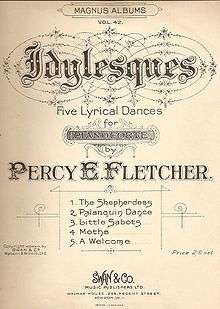Percy Fletcher
Percy Eastman Fletcher (12 December 1879 – 10 December 1932) was a British composer of classical music, born in Derby. He worked as musical director at London theatres including the Drury Lane Theatre and, from 1915 onward, His Majesty's Theatre. Besides, he wrote ballads, works for chorus, and suites for light orchestra, organ voluntaries for church use, as well as pieces commissioned for brass band competitions, including the tone poem Labour and Love used by the Irwell Springs Band to win the 1913 National Championships.[1] This piece is often regarded as a significant moment in the development of the modern brass band movement and repertoire. It was followed by 'An Epic Symphony', used as the test piece for the Championship Section of the National Championships in 1926.[2]

An article written for the brass band website 4barsrest.com places Fletcher amongst the ten greatest brass band composers.[3]
Works
- Vanity Fair
- Labour And Love
- Folk Tune and Fiddle Dance
- An Epic Symphony
- Idylesques
- Fountain Reverie for organ
- Festival Toccata for organ
- A Song of Victory for SATB chorus and piano
- Hymn Tune Voluntaries for the Organ, American Organ or Harmonium, parts 1, 2 and 3, Curwen, 1906
- The Walrus and the Carpenter, by Lewis Carroll, set to music by Percy E Fletcher, Novello, 1910
- The Deacon's Masterpiece or The Wonderful "One-Hoss Shay", a poem by Oliver Wendell Holmes, set to music by Percy E Fletcher, Novello 1911.
- Ring Out, Wild Bells, a "Festival Carol" for choir and organ, Novello, 1914
References
- Scowcroft, Philip L. "The Music of Percy Fletcher". Retrieved 2007-12-16.
- https://brassbandresults.co.uk/pieces/epic-symphony/
- http://www.4barsrest.com/articles/2002/art189.asp